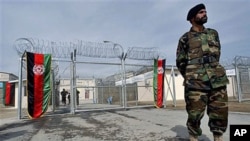A new United Nations report says Afghan police and intelligence officers are systematically torturing some detainees in their custody. The abuses detailed in the report were found to be so widespread that the U.S. and its allies have suspended turning over suspected Taliban detainees to Afghan government control in some areas. The U.S. may also have to suspend some security aid to units involved in the abuses.
In a detailed report drawn from interviews with over 300 detainees, the United Nations found torture to be widespread at detention facilities run by the Afghan National Directorate of Security, or NDS, and the Afghan National Police, the ANP.
The U.N. mission found that police and intelligence officers routinely beat suspects, subjected them to electric shock, wrenched out their toenails, and sexually abused them. The report says the abuse became so pervasive that in July U.S. and NATO forces stopped handing over suspected Taliban members to Afghan-run detention facilities in several provinces.
The Afghan government denies the worst of the allegations, but acknowledges what it calls "deficiencies" in the detainee system.
The ANP and the NDS are being trained by U.S. and allied forces. As Tom Malinowski, Washington director of Human Rights Watch, points out, the U.N. report puts the U.S. in an awkward position. “This report clearly implicates the NDS, the intelligence service in Afghanistan, and also some police units. So the implication of that is that those units are going to have to clean up their act. And the U.S. embassy is going to have to work very hard with the Afghan government to ensure that that happens, if U.S. assistance is going to continue," he said.
As the U.N. report itself points out, torture and ill-treatment could spark invocation of the so-called “Leahy law.” That law, named after its sponsor, Sen. Patrick Leahy, stipulates that the U.S. cut off funding, training, and weapons to any unit of a foreign country if they have committed gross human rights violations.
Malinowski says the Obama administration has no choice but to invoke the provisions of the law. “Well, they have to invoke it. It’s not an option. It’s not something that they will or will not do based on me calling on them to do it. It’s something that they have to do under the law. And I imagine that they will because the evidence here is so clear," he said.
Mike Gerhardt of the University of North Carolina, who has served as a legal advisor to Senator Leahy among others, says that does not mean the U.S. would cut off security assistance to Afghanistan, only to specific units. “If you take its language literally, it has to do with withdrawing support for a particular unit that is found to be committing violations. So that might be a very specific thing, and the money could be moved elsewhere. So it’s hard to say how much of an impact it would have. Much depends on the extensiveness of the violations," he said.
But there is a loophole.
According to the language of the law, its provisions to cut off aid may not be invoked if the secretary of state determines that the concerned government is taking effective remedial measures.
Mike Gerhardt says the decision is not a cut-and-dried legal one. “Well, it would be both a political and a legal decision. Obviously they’d probably want to ensure that they’re doing something that’s consistent with the law. And at the same time, they’ve got to take into account the political and other ramifications of their decisions," he said.
Tom Malinowski says the Afghan intelligence service as a whole could be sanctioned, but adds that it could escape punishment if its assistance comes from the CIA and other intelligence agencies. “I think the NDS would count as a unit under the Leahy law. What’s less clear to me is what assistance the NDS gets. And I think it may well not be - and this is maybe where things get a bit murky - it may not be assistance that passes through the State or Defense Department budget. It may be something that passes through the intelligence budget," he said.
U.S. officials say the Embassy in Kabul is devising a monitoring system for Afghan-run detention centers, and a NATO statement says allied officials are working with the U.S. to establish new safeguards to prevent detainee abuse.
Afghan Prisoner Abuse Could Trigger Some Aid Suspension
- By Gary Thomas












